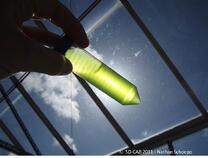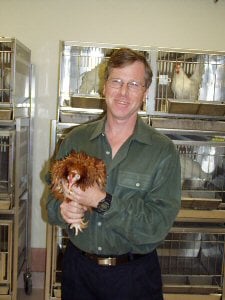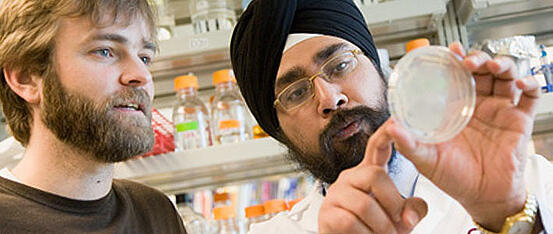 As humans, our bodies have the ability to naturally regenerate both skin and hair, but we only get two sets of teeth, and that's one set more than many other mammals. Reptiles and fish, on the other hand, have the ability to regrow teeth throughout their lifetime. Though we have guessed that specialized stem cells are involved, the cellular and molecular mechanisms behind tooth renewal in these animals have not been well understood until now. A research team at the University of Southern California's Keck School of Medicine, led by Dr. Cheng-Ming Chuong, has recently published an article in PNAS detailing their study into the regrowth of alligator teeth. They chose a crocodilian model because the dentition is well-organized and implanted in sockets of the dental bone, similar to that of mammals (if more extensive) yet with the capacity for renewal. Contributors to the research included colleagues in Georgia, China, and the Louisiana Department of Wildlife and Fisheries, who presumably provided the live research subjects.
As humans, our bodies have the ability to naturally regenerate both skin and hair, but we only get two sets of teeth, and that's one set more than many other mammals. Reptiles and fish, on the other hand, have the ability to regrow teeth throughout their lifetime. Though we have guessed that specialized stem cells are involved, the cellular and molecular mechanisms behind tooth renewal in these animals have not been well understood until now. A research team at the University of Southern California's Keck School of Medicine, led by Dr. Cheng-Ming Chuong, has recently published an article in PNAS detailing their study into the regrowth of alligator teeth. They chose a crocodilian model because the dentition is well-organized and implanted in sockets of the dental bone, similar to that of mammals (if more extensive) yet with the capacity for renewal. Contributors to the research included colleagues in Georgia, China, and the Louisiana Department of Wildlife and Fisheries, who presumably provided the live research subjects.
Tags: 2014, CA, 2013, University of Southern California, Regenerative Medicine, Stem cell research, Southwest, California, USC, Los Angeles, biology research, BioResearch Product Faire Event, Front Line event
Given the widespread use and abuse of alcohol for recreation, a drug that could interrupt its effects would have enormous value in treating alcoholism. Since addiction is based on stimulating pleasure centers, scientists have been looking for a way to block that interaction between alcohol and the brain. The challenge has been to find a key protein that carries out this transmission and identify its binding site. Now, biologists in the Harris Lab at the University of Texas Austin have made a major research breakthrough validating the importance of certain ligand-gated ion channels in that process and locating a cavity where the binding takes place. Remarkably, they were able to push their research forward thanks to an obscure alpine cyanobacteria recently sequenced in France.
Tags: 2014, 2013, University of Texas, Southwest, UTAust, alcoholism research, brain research, biology research, bio research, Austin, BioResearch Product Faire Event, TX
 If Dr. Seuss were still writing his wonderous books and turned his attention to biotechnology today, we might see a title like Ah, the Things You Can Do With Algae! At the University of California San Diego a number of research institutions have joined together to form the San Diego Center for Algae Biotechnology (SD-CAB) where scientists are pursuing all sorts of innovative projects using the ubiquitous green matter that also happens to be a genetic model organism. Which means it is not only easy to grow, but it can do things that bacteria and even mammalian cells can't, like host a genetically engineered protein that targets cancer.
If Dr. Seuss were still writing his wonderous books and turned his attention to biotechnology today, we might see a title like Ah, the Things You Can Do With Algae! At the University of California San Diego a number of research institutions have joined together to form the San Diego Center for Algae Biotechnology (SD-CAB) where scientists are pursuing all sorts of innovative projects using the ubiquitous green matter that also happens to be a genetic model organism. Which means it is not only easy to grow, but it can do things that bacteria and even mammalian cells can't, like host a genetically engineered protein that targets cancer.
Tags: CA, University of California San Diego, cancer research, cell biology, Southwest, California, 2012, biology research, UCSD, Biotechnology Vendor Showcase, San Diego Biotechnology
In the search for early life we are going where we have never gone before...with newly-funded astrobiology research at the University of Illinois.
Tags: Midwest, Bioresearch, Bioresearch funding, University of Illinois Urbana-Champaign, 2012, Illinois, biology research, BioResearch Product Faire Event, Funding, Research Funding, IL, genomics research, research grant, new research grants, UIUC
"High-risk, high-reward" life science research funding isn't something we hear about very often in these days of fiscal belt-tightening, especially coming from the private sector. Fortunately the NIH is still committed to supporting exceptional life science labs that take the road less travelled, with the Director's Transformative Research Awards and the Director's New Innovator Awards, because the potential payoff justifies the gamble taken. The NIH has standard criteria by which they evaluate grant proposals. Realizing that those criteria would enevitably leave out some of the most daring and ground-breaking research, they came up with the High Risk awards. 2012 Director's Awards from the NIH Common Fund (totalling some $155M) have gone to 81 investigators, and 5 of them are faculty members and heads of laboratories at Rockefeller University.
Tags: Rockefeller University, Northeast, RNA research, New York, 2012, biology research, BioResearch Product Faire Event, Funding, NY, NIH, New York City, new research grants, Rockefeller, early career funding
Tags: Fred Hutchinson Cancer Research Center, Washington, AIDS Research, WA, evolution research, 2012, biology research, biology research scientists, BioResearch Product Faire Event, Genetics, Seattle
Tags: CA, University of California San Diego, Stem cell research, Southwest, California, 2012, biology research, bio research, biology research scientists, Neuroscience, San Diego, UCSD, La Jolla, Biotechnology Vendor Showcase, Salk, cord blood
Anyone who's ever pulled an all-nighter to finish a project knows how it wreaks havoc with your metabolism. The fact is, it's not just a nicety to be awake and active during the day and sleep at night: it's the way bodies are hard-wired. Scientists have long-suspected that upsets in a person's biological clock could play a factor in the development of metabolic disorders like diabetes. Now a team of researchers from three Southern California universities has made surprising discoveries that support that hypothesis. Not only have they isolated the protein that regulates the biologic clock (and named it cryptochrome), but they have found a molecule called KL001 that dictates when cryptochrome gets sent to the proteasome recycling bin. Which is to say, they now know a lot more about this complex circadian system that not only tells the body when to sleep and wake, but also how the body should manage glucose levels in those periods of relative activity and dormancy. The bio research study was published in the July 13 advance online issue of the journal Science.
Tags: CA, University of California San Diego, University of Southern California, Diabetes, Southwest, California, 2012, University of California Santa Barbara, USC, Los Angeles, Biochemistry, Scripps, biology research, bio research, Front Line event, NSF
The summer of 2012 is set to go down as one of the driest and worst years for US farmers, but it's proving to be an excellent season for fruit science, especially at the University of Arizona, Tucson. In June we saw the sequencing of the tomato genome (technically a fruit), which was a breakthrough in genetics research. The Arizona Genomics Institute has now cracked another complex code: the genome of the banana.
Tags: University of Arizona, DNA Sequencing, genomic research, DNA Research, genome research, banana, University of Arizona Tucson Research, Southwest, 2012, biology research, Arizona, AZ, Genetics, Front Line event, genomics research, Tucson, UA
 The University of Southern California has a thriving regenerative medicine research headquarters at the Broad Center within the Keck School of Medicine. Established in 2006, the Center's $80M state-of-the-art building opened in 2010 to house eleven research teams and four core laboratories. In addition to seeking out therapeutics, though, a team of USC stem cell scientists is marrying their study of stem cell functioning to a more thorough understanding of regenerative biology as it happens naturally in many species of animal. Drs. Cheng-Ming Chuong, Randall B. Widelitz (right), Ping Wu, and Ting-Xin Jiang of the Department of Pathology discuss their lab research, which looks at stem cells in hair and feathers in particular, in a recent article published in the journal Physiology.
The University of Southern California has a thriving regenerative medicine research headquarters at the Broad Center within the Keck School of Medicine. Established in 2006, the Center's $80M state-of-the-art building opened in 2010 to house eleven research teams and four core laboratories. In addition to seeking out therapeutics, though, a team of USC stem cell scientists is marrying their study of stem cell functioning to a more thorough understanding of regenerative biology as it happens naturally in many species of animal. Drs. Cheng-Ming Chuong, Randall B. Widelitz (right), Ping Wu, and Ting-Xin Jiang of the Department of Pathology discuss their lab research, which looks at stem cells in hair and feathers in particular, in a recent article published in the journal Physiology.
Tags: University of Southern California, Stem cell research, USC Science, Southwest, California, Los Angeles, animal science, biology research, Front Line event


